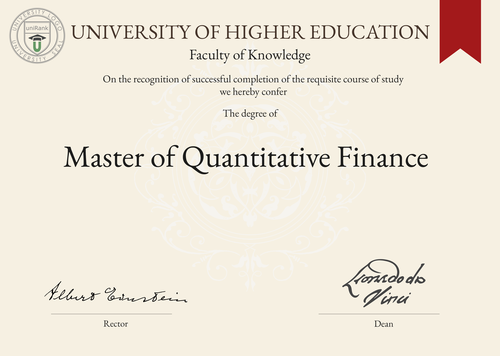
Master of Quantitative Finance (MQF)
Guide to Master of Quantitative Finance Program/Course/Degree
Master of Quantitative Finance (MQF)

Degree Name:
Master of Quantitative Finance
Degree Abbreviation:
MQF
Duration Range:
1-2 years
Tuition Range (US, UK, AUS, NZ):
$20,000-$60,000
Overview:
The Master of Quantitative Finance degree is designed to provide students with a strong foundation in mathematical and statistical methods, financial theory and computational techniques. This degree is ideal for individuals who are interested in pursuing a career in finance, risk management, or financial engineering.
Curriculum Overview by Year:
- Year 1: Financial Mathematics, Probability Theory, Financial Markets and Instruments, Financial Econometrics, Corporate Finance
- Year 2: Derivatives Pricing, Risk Management, Portfolio Management, Stochastic Calculus, Computational Finance
Key Components:
- Mathematical and Statistical Methods
- Financial Theory
- Computational Techniques
- Financial Markets and Instruments
- Derivatives Pricing
- Risk Management
- Portfolio Management
- Stochastic Calculus
- Financial Econometrics
- Corporate Finance
Career Prospects:
Graduates of the Master of Quantitative Finance degree can pursue careers in a variety of fields, including investment banking, asset management, risk management, financial engineering and quantitative analysis. Some of the job titles that graduates may hold include Quantitative Analyst, Risk Manager, Portfolio Manager and Financial Engineer.
Salary Expectations:
The salary expectations for graduates of the Master of Quantitative Finance degree can vary depending on the industry, job title and location. According to Payscale, the average salary for a Quantitative Analyst is $85,000 per year, while the average salary for a Risk Manager is $100,000 per year.
For a more accurate understanding of salary expectations, you can utilize the Job Sites Search Engine, from our sister site jobRank, which searches over 4,600 job sites worldwide. Make sure to specify not only the job title but also the country you are interested in.Conclusions:
Overall, the Master of Quantitative Finance degree is a rigorous and challenging program that prepares students for a variety of careers in finance. It is important to note that the duration, tuition fees, curriculum, key components, career prospects and salary expectations can vary depending on the country and university where the degree is pursued. Visitors can search for where this specific degree is offered anywhere in the world through the uniRank World Universities Search Engine.
World Universities Search Engine
search for Master of Quantitative Finance (MQF) and add the Location (country, state etc.) or specific University you are interested in studying at.
Query examples:
- Master of Quantitative Finance (MQF) United States
- Master of Quantitative Finance (MQF) United Kingdom online
- Master of Quantitative Finance (MQF) Australia international students
- Master of Quantitative Finance (MQF) University of California
- Master of Quantitative Finance (MQF) University of London tuition fees
- Master of Quantitative Finance (MQF) University of Sydney scholarships
Share Program/Course
Interesting? Share this program/course/degree info with your friends now.